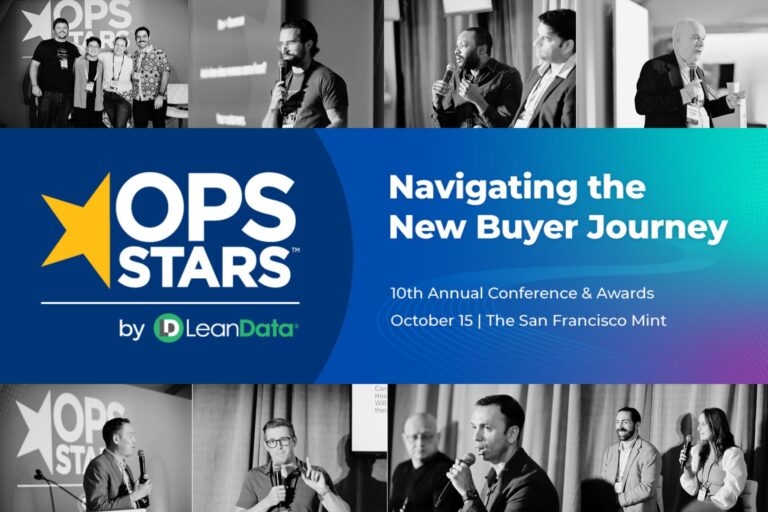SUNNYVALE, Calif., July 31, 2018 – LeanData, the leader in Lead-to-Account Matching, Routing, and Marketing Attribution solutions, along with Sales Hacker, the leading resource for sales innovation, acceleration, and the future of sales, announced today the launch of their joint research study,The State of Revenue Operations: A Survey of B2B Sales and Marketing Professionals. Nearly 1,000 B2B sales and marketing professionals and decision-makers shared their perspectives on the ever-growing trend of Revenue Operations.
Revenue is the lifeblood of companies, which means it is natural for companies to obsess over finding new strategies to accelerate growth continually. Over the years, enterprises tested and tried a plethora of approaches in hopes of finding a silver bullet for generating revenue, including the rise of the Chief Revenue Officer (CRO) position. The role of the CRO, which focuses solely on leading strategies around revenue generation, continues to be adopted by enterprises. Now, conversations around the concept of revenue ops intensify as B2B enterprises compete for customers and dollars. As the adoption rate for CROs continues to grow, the probability of revenue operations becoming a staple business strategy among B2B organizations becomes increasingly likely. The question on B2B sales and marketing professionals’ minds is, will revenue operations crack the code to efficient and predictable go-to-market (GTM) execution and revenue generation?
“Today’s B2B organizations are under constant pressure to continuously innovate on their GTM strategies to scale revenue and grow market share. In order to be successful, I firmly believe that Operations, through its management of data and processes, must have a seat at the executive leadership table,” said Evan Liang, Co-Founder, Chief Executive Officer, LeanData. “The goal of revenue ops is to unify and increase revenue generation through the use of data and technology in order to create a seamless revenue engine. That is is the promise of revenue operations, but the question remains, is this the right business strategy to elevate sales, marketing, and customers operations to its proper place within revenue generation teams?”
Nearly 1,000 sales, marketing professionals, and executives provided their insights on how their respective companies perceive, adopt and implement a revenue operations model:
- Defining RevOps: Today, there is not a single definition of revenue operations that B2B sales and marketing professionals can unanimously agree on. Typically, revenue ops encompass various departments within an enterprise. According to the State of Revenue Operations survey, over 45% of respondents consider revenue operations to be a unified coalition between sales, marketing, and customer success teams. Furthermore, nearly 25% of respondents would add operations teams to the group.
- Building a RevOps Team: Despite the growing number of conversations, the majority of B2B organizations are not rushing to adopt revenue ops. In fact, nearly 60% of respondents said their companies do not have a revenue operations team. For many B2B enterprises, there are numerous challenges to create a revenue ops team, including a lack of institutional knowledge on how to build a revenue operations team (approximately 32%), and failure to create the right team structure (almost 21%). Despite the challenges, the survey uncovered a small but growing group of B2B enterprises who have or creating their own revenue ops teams. An estimated 21% of respondents said their respective companies had built a revenue ops team, while over 15% said their companies were in the process of building revenue ops teams.
- The Catalyst for Change to Revenue Operations Model: For many B2B organizations, there are specific reasons to shift to a revenue ops model, in fact over 50% of survey respondents said that there are many specific business reasons for implementing the revenue ops strategy into their organization. Account-Based Marketing (ABM) was named as one of the business strategies that has encouraged companies to apply a revenue ops model. “The advent of ABM (which involves marketing and sales working closely together) and the increasing importance of net retention (which requires close coordination between sales, marketing, and customer success) has made a true revenue ops function critical to success”, said Andrew Mowat, Vice President, Growth Operations, Culture Amp. Furthermore, nearly 20% of respondents believe that the complexity of data and technology stacks is a primary reason for embracing the revenue operations model.
- Who Owns the Revenue Metrics and KPIs: A significant point of contention in conversations around revenue operations is which team is responsible for owning the revenue metrics and KPIs. According to the survey, there is a wide range of opinions on the topic: 45% of respondents believed that sales, marketing, and customer success should share the responsibility of owning revenue metrics and KPIs. LeanData’s Chief Marketing Officer, Karen Steele offers the following perspective, “to drive revenue more efficiently and to optimize internal processes, businesses are seeking dedicated revenue ops teams that own their respective revenue ops KPIs. It’s not just a siloed sales or marketing exercise anymore. Driving revenue is a hybrid responsibility.” On the other hand, over 30% of respondents said that operations should be the owner of revenue metrics and KPIs versus sales (nearly 24%) and marketing teams (11.6%).
“Revenue Operations is more than a trend, it is a movement of B2B organizations eliminating the silos between sales, marketing, and operations teams to drive growth,” said Max Altschuler, Chief Executive Officer, Sales Hacker. “Although the trend is still in its infancy, we see high-growth companies experiment, even implement a revenue operations model and are starting to experience the benefits. Over the next several years, we can expect to see revenue ops become a critical business strategy for B2B enterprises.”
About LeanData
LeanData is the leader in Lead-to-Account Matching, Routing, and Marketing Attribution solutions. We stand at the center of your CRM, connecting data to the right people. By aligning marketing and sales with accurate matching, routing, and accurate attribution, sales reps only get the leads, contacts, accounts, and opportunities they need to work on, so they can close more deals and drive more revenue, faster.
LeanData is helping over 360 customers, including Marketo, Adobe, and Glassdoor, reduce complexity and frustration while accelerating revenue.
Visit leandatainc.com for more information.
About Sales Hacker
Sales Hacker is the world’s top destination for all things sales innovation and sales acceleration. We provide you with educational and actionable content that you can leverage in your sales process immediately.
We provide world-class thought-leadership, webinars, conferences, worldwide meetups, online courses, sales training & digital partnerships.
Visit saleshacker.com for more information.
Media Contact
Margo Mendez-Penate
LeanData
Supporting Quotes
- “The insights-driven decision making required by modern marketing and sales is a threat to organizations with insufficient operations talent and resources. If operations activity stopped moving forward, the go-to-market wheel would stop turning,” said Allison Snow, Senior Analyst, Forrester
- “The main goal of revenue operations is to break down the operations silos. The revenue operations team is the central hub of information for the entire organization,” said Joe Gelata, Vice President, Business Operations, Axonify
- “I view revenue operations as a natural evolution where organizations are seeing value in merging various operation teams while leaving the day-to-day structures of marketing, sales, and customer success teams intact,” said Dheer Gupta, Director of Revenue Operations and Strategy, HappyCo
- “We think of revenue operations as encompassing the strategy, execution, optimization of all systems, processes, people, and tactics related to generating cash for the business,” said Greg Poirier, President, CloudKettle. “Essentially, it’s the overall machine that helps improve the performance of sales, marketing and perhaps most importantly for SaaS companies, customer success.”
- “The biggest pitfalls for organizations that shift to a revenue operations model is to mistake correlation with causation,” said Jacco vanderKooij, Founder, Winning By Design. “Sales historically has been filled with leaders who contributed growth based on a correlation. As a result, many have scaled the business prematurely or too late.”
- “Revenue operations is about treating sales as a science,” said Dominique Levin, Managing Partner, Winning By Design. “Sales strategists instrument the sales process and sales team, use benchmark data, dig deep for the root cause of any gaps, and then work cross-functionally to implement processes, coaching, organizational design, compensation plans, and sales technologies to drive growth.”
- “As much as we’ve discussed revenue operations, the consensus just isn’t there yet,” said Maile Johnson, Senior Director, Demand Generation Marketing, LeanData. “Most people know what it is, but it’s possible the value is not well defined. This survey shows that that’s a widespread problem. Businesses should be aware that they’re not alone in their difficulties, or successes, with revenue operations.”
- “The necessity to break down silos is a major catalyst for the emergence of revenue operations as a function,” says Gaetano DiNardi, Vice President, Marketing, Sales Hacker. “The majority of respondents said the revenue operations team should own KPIs and metrics that hold sales and marketing accountable, which is a remarkable shift in the way modern organizations are thinking about measurement.”
- “Revenue operations roles were created from the need to manage a shared responsibility, driving growth and ROI,” said Brian Skipper, Head of Sales Operations, LeanData. “Revenue Operations is still being defined to help drive corporate accountability and results. This strategy will help bring departments closer together guiding all teams to overall company revenue goals.”






